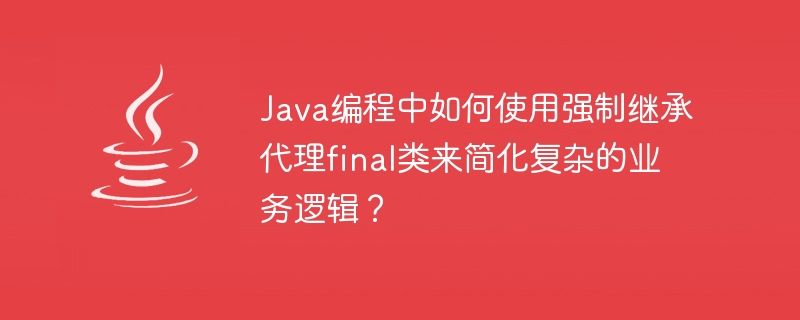

How to use forced inheritance proxy final class to simplify complex business logic in Java programming?
In Java programming, we often encounter complex business logic. These business logics contain a large number of conditional judgments, error handling, data conversion, etc., which are difficult to maintain and reuse. In order to simplify these complex business logic, we can use the technique of forced inheritance to proxy final classes.
First, let us understand the concepts of final classes and inheritance. In Java, a class can be declared as non-inheritable using the final keyword. This means that the class cannot be extended through inheritance, nor can its methods be redefined in subclasses. However, we can solve this problem using inherited proxies.
Inheriting a proxy means creating a new class with the same interface as the proxied class, and then calling the method of the proxied class in the new class. In this way, we can extend the functionality of the proxied class in the new class without directly inheriting the proxied class. This approach follows the principle of "composition over inheritance" and provides a more flexible and extensible code structure.
Next, let us use an example to illustrate how to use forced inheritance to proxy final classes to simplify complex business logic.
Suppose we want to implement an order processing system, which includes the following commodities: electrical appliances, food and clothing. Each item has different attributes and methods of calculating price. In order to simplify the code, we will create a final class Product to represent the product:
public final class Product {
private String name;
private double price;
public Product(String name, double price) {
this.name = name;
this.price = price;
}
public String getName() {
return name;
}
public double getPrice() {
return price;
}
// 省略其他属性和方法
}In this final class, we only define the basic attributes and methods of the product, and the specific calculation price logic etc. will be implemented in subclasses.
Next, we create an abstract class ProductProxy to proxy the final class Product:
public abstract class ProductProxy {
private Product product;
public ProductProxy(Product product) {
this.product = product;
}
public Product getProduct() {
return product;
}
public abstract double calculatePrice();
// 其他通用的业务逻辑,如数据转换等
}In this abstract class, we hold a The proxied final class object defines an abstract method calculatePrice() to calculate the product price. At the same time, we can also add other general business logic methods to this abstract class, such as data conversion, etc.
Next, we create a specific proxy class ElectronicProductProxy to proxy the electrical class:
public class ElectronicProductProxy extends ProductProxy {
public ElectronicProductProxy(Product product) {
super(product);
}
@Override
public double calculatePrice() {
// 实现电器类商品的价格计算逻辑
return getProduct().getPrice() * 1.1;
}
// 其他特定于电器类商品的业务逻辑
}In this specific proxy class, we override the abstract methodcalculatePrice()To implement the price calculation logic of electrical appliances. At the same time, we can also add other business logic methods specific to electrical appliances.
In the same way, we can create other proxy classes to proxy food and clothing products.
By using forced inheritance of the proxy final class, we encapsulate complex business logic in the proxy class, making the code clearer and easier to maintain. At the same time, we can also flexibly expand the functions of each product according to actual needs without affecting the implementation of other products.
In summary, by using the technique of forced inheritance to proxy final classes, complex business logic can be simplified and the maintainability and scalability of the code can be improved.
The above is the detailed content of How to use forced inheritance proxy final class to simplify complex business logic in Java programming?. For more information, please follow other related articles on the PHP Chinese website!




